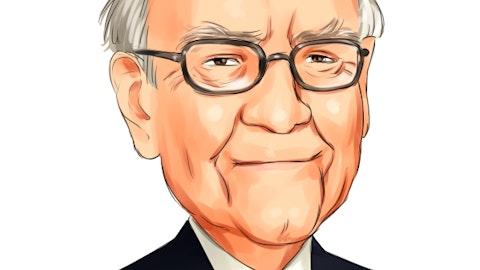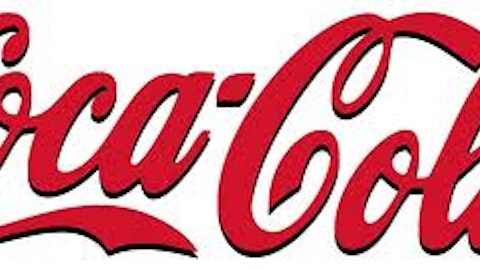Okay, Okay! Another ‘Warren Buffett buys this, Buffett buys that’ article. I know what you are thinking and yes, my eyes glaze over with boredom too when I come across a piece about Buffett. However bear with me; I’m going to cut to the chase and outline and discuss some of his major common stock holdings as discussed in Berkshire Hathaway Inc. (NYSE: BRK.B)’s recent annual letter. He is well worth picking ideas from because he is a fantastic investor, and unlike the proselytizing clowns you see on television he has an easily identifiable track record.

This is the first time I have looked at this in any depth and was surprised to find a few stocks in common. Tomes of verbiage have been created on the subject of his investing so I can be allowed a few words too. He is definitely a value investor in the sense of finding intrinsic value and being willing to wait for the market to see it so he can realize his gains. As I never tire of pointing out, all thematic, evaluation based or even technical and mechanical based strategies will produce unintentional style or sector biases. In fact, you can see a classic example of this in 1999 where he massively underperforms (as the market piles into technology but he doesn’t) and then he outperforms for the three years when the tech bubble bursts. He then underperforms as the cyclical stuff makes a comeback in 03-04.
With that said, here are Berkshire Hathaway’s holdings (as listed in the letter) that had a market value of more than $1 billion.

These stocks make up 87% of the total common stock holdings. In other words, they will make a significant difference to BRK’s performance.
Delving Deeper
Buffett previously made the case for a recovery in the US housing market, and I think this is a large part of his case for holding Wells Fargo & Co (NYSE:WFC). The bank is making aggressive inroads into the US mortgage market and is set to be a key beneficiary of a recovery in housing and credit quality improvements. One issue that is challenging the banks in 2013 is that net interest margin (NIM) will be pressured as the loan book matures (containing older loans at a higher rate of interest) and as deposits grow the NIM will be pressured on both sides. Indeed, Wells Fargo & Co (NYSE:WFC) did recently report declining NIM. However, as outlined here the key point is that the economy is improving so all those extra deposits are likely to be used to expand Wells Fargo & Co (NYSE:WFC)’s loan book, and credit quality improves with a better economy. Similarly American Express Company (NYSE: AXP) is a play on the US credit cycle.
International Business Machines Corp. (NYSE: IBM) is a stock I bought recently, and I confess that when I bought it I wasn’t convinced I was buying a technology company! There is a write-up of the stock linked here, and what investors should note is that this isn’t an IT stock in the sense that it has a proprietary or disruptive technology that is fighting to create or punctuate a market. On the contrary, IBM is more of a ‘blocking and tackling’ play. The company is cutting costs and focusing on shifting to higher margin work, so the next time someone yaps about its low single digit revenue growth then point out the margin expansion, free cash flow and double digit EPS growth. In a sense it is a classic Buffett play because it is releasing the intrinsic value in its business via these measures.
There are four stocks that we can call consumer staples. The Coca-Cola Company (NYSE: KO) and The Procter & Gamble Company (NYSE:PG) are classic examples, but Wal-Mart Stores, Inc. (NYSE: WMT) and the Tesco Corporation (USA) (NASDAQ: TESO) are also mass market supermarkets. I hold Tesco, and it is well worth a look for adventurous US investors. It lost its way with a focus on overseas expansion, which caused it to drop the ball in its home UK market. However it is now restructuring and retains a dominant position in the UK.
The evaluation is cheap and it pays a large dividend. Turning to The Procter & Gamble Company (NYSE:PG), this is a company that has found the recession more difficult to manage than most. It has a lot of premium brands, and the challenge has been to defend the pricing of these brands as it was losing market share to competitors with value brands or more innovative companies like Colgate-Palmolive Company (NYSE: CL). In the good old days the recovery would come along and The Procter & Gamble Company (NYSE:PG) would reap the benefits of protecting the value of its brands through the recession, but as we all know the mass consumer market has taken a long time to come back. Nevertheless, the potential to release the value in its brands is significant.
I wasn’t surprised to see Munich Re in the list because there are few people on this earth who know more about the insurance industry than he does, but I was somewhat surprised to see French pharmaceutical giant Sanofi SA (ADR) (NYSE:SNY) on the list. It is certainly a value play (at least I hope so because I hold it), but it also has some competitive risk with a hugely important diabetes franchise, in particular from Novo Nordisk A/S (ADR) (NYSE: NVO).
The situation has been volatile in early 2013. Sanofi has a market leading long acting insulin (Lantus), which is facing competition and patent expiry in the next two years. Originally speculators thought that Novo’s long acting insulin degludec (Tresiba) would receive a positive FDA decision (an FDA committee had recommended it), but the FDA came back asking for more detail. In the meantime, Sanofi’s Lxyumia (type 2 diabetes intended for combination with Lantus) Phase III will not be initiated in 2013. Naturally all of these developments in such a short space of time sent the stocks up and down like a yo-yo.
Putting all of this together, it is quite clear that Buffett is sticking with his value credentials, and it’s a good idea for private investors to follow him with it.
The article What Stocks Are in Buffett’s Annual Letter? originally appeared on Fool.com and is written by Lee Samaha.
Copyright © 1995 – 2013 The Motley Fool, LLC. All rights reserved. The Motley Fool has a disclosure policy.




